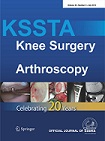
ARTHROPLASTY
Patellar eversion & non-eversion have similar clinical outcomes in total knee arthroplasty
Knee Surg Sports Traumatol Arthrosc. 2016 Jan;24(1):141-75 randomized controlled trials comparing patellar eversion and non-eversion in patients undergoing primary total knee arthroplasty were included. The purpose of this study was to determine if patellar eversion was associated with negative clinical outcomes when compared to patellar non-eversion. Quantitatively pooled results displayed no significant difference between groups in terms of pain assessed with a visual analogue scale, and complications. Qualitative assessments displayed no significant differences between groups in hip function, quality of life, quadriceps strength, patellar height, and radiographic alignment.
Unlock the full ACE Report
You have access to {0} free articles per month.Click below to unlock and view this {1}
Unlock NowCritical appraisals of the latest, high-impact randomized controlled trials and systematic reviews in orthopaedics
Access to OrthoEvidence podcast content, including collaborations with the Journal of Bone and Joint Surgery, interviews with internationally recognized surgeons, and roundtable discussions on orthopaedic news and topics
Subscription to The Pulse, a twice-weekly evidence-based newsletter designed to help you make better clinical decisions
Exclusive access to original content articles, including in-house systematic reviews, and articles on health research methods and hot orthopaedic topics
Or upgrade today and gain access to all OrthoEvidence content for just $1.99 per week.
Already have an account? Log in


Subscribe to "The Pulse"
Evidence-Based Orthopaedics direct to your inbox.
{0} of {1} free articles
Become an OrthoEvidence Premium Member. Expand your perspective with high-quality evidence.
Upgrade Now












































































